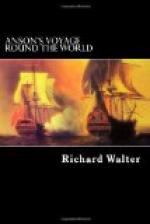The winds were so contrary that we had the mortification to be forty days in our passage from St. Helens to the island of Madeira, though it is known to be often done in ten or twelve. However, at last, on Monday, October the 25th, at five in the morning, we, to our great joy, made the land, and in the afternoon came to an anchor in Madeira Road.
We continued about a week at this island, watering our ships and providing the squadron with wine and other refreshments.
When Mr. Anson visited the Governor of Madeira* he received information from him that for three or four days in the latter end of October there had appeared, to the westward of that island, seven or eight ships of the line. The Governor assured the Commodore, upon his honour, that none upon the island had either given them intelligence or had in any sort communicated with them, but that he believed them to be either French or Spanish, but was rather inclined to think them Spanish. On this intelligence Mr. Anson sent an officer in a clean sloop eight leagues to the westward to reconnoitre them, and, if possible, to discover what they were. But the officer returned without being able to get a sight of them, so that we still remained in uncertainty. However, we could not but conjecture that this fleet was intended to put a stop to our expedition. Afterwards, in the course of our expedition, we were many of us persuaded that this was the Spanish squadron commanded by Don Joseph Pizarro, which was sent out purposely to traverse the views and enterprises of our squadron, to which in strength they were greatly superior.
(Note. Madeira then as now belonged to Portugal—a neutral power at that time usually jealous of Spain.)
CHAPTER 2. SPANISH PREPARATIONS—FATE OF PIZARRO’S SQUADRON.
Don Joseph Pizarro.




